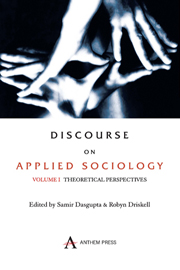Book contents
- Frontmatter
- Contents
- Preface and Acknowledgement
- Contributors to this Volume
- List of Abbreviations
- Introduction
- 1 Re-Orient World History, Social Theory and the Nineteenth Century
- 2 The Unique Complexity of Social Phenomena and the Uses of Social Science Knowledge
- 3 Unlimited Love, Compassion and Forgiveness: Acts of Moral Examplars
- 4 Theoretical Application
- 5 Applied Sociology's Need to Rethink the Tradition: Sociological Theorizing in a Global Framework
- 6 Social Analysis and Social Action
- 7 The Applied Sociologist as Craftsman
- 8 Applied Sociologists: Its Problems and Prospects
- 9 Sociology and its Application in Society: Giving Sociology its ‘Working’ Meaning
- 10 The Evolution of Sociology Back to its Applied Future
- 11 Contemporary Corporate Crime: Theoretical Perspectives, Cases & Consequences
- Index
4 - Theoretical Application
Published online by Cambridge University Press: 05 March 2012
- Frontmatter
- Contents
- Preface and Acknowledgement
- Contributors to this Volume
- List of Abbreviations
- Introduction
- 1 Re-Orient World History, Social Theory and the Nineteenth Century
- 2 The Unique Complexity of Social Phenomena and the Uses of Social Science Knowledge
- 3 Unlimited Love, Compassion and Forgiveness: Acts of Moral Examplars
- 4 Theoretical Application
- 5 Applied Sociology's Need to Rethink the Tradition: Sociological Theorizing in a Global Framework
- 6 Social Analysis and Social Action
- 7 The Applied Sociologist as Craftsman
- 8 Applied Sociologists: Its Problems and Prospects
- 9 Sociology and its Application in Society: Giving Sociology its ‘Working’ Meaning
- 10 The Evolution of Sociology Back to its Applied Future
- 11 Contemporary Corporate Crime: Theoretical Perspectives, Cases & Consequences
- Index
Summary
What good is it to strive after knowledge of reality if the knowledge we acquire cannot serve us in our lives.
Emile DurkheimThe study of sociology began as a practical discipline, concerned with the alleviation of social problems through rational, logical analyses of the nature of the community. Sociology is the quintessential Enlightenment product – based on the commitment to the value of objective reason – a means for achieving social progress and harmony. What now seems naivety to many was considered to be an achievable goal – that a new world was possible and the sociologist, as the scientist of the social, was best placed to assist in the production of such a world. Naïve or not, it meant that the idea of sociological theory as different in some way from applied sociological work was inconceivable. As Marx suggested, it was not sufficient to interpret the world, the world also needed a change – a sentiment that was common to the varying perspectives of classical sociology (as well as to some recent sociology such as feminist sociology). But agreement as to how sociology could best affect positive social change has been a contested issue. It also partially explains the idea that developed in contemporary sociology that there is an abstract realm of theoretical discourse which is separated from the empirical investigation of social problems and the application of the findings. As stated above, this viewpoint would have been antithetical to early sociology.
- Type
- Chapter
- Information
- Discourse on Applied SociologyTheoretical Perspectives, pp. 125 - 134Publisher: Anthem PressPrint publication year: 2007



